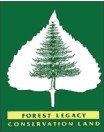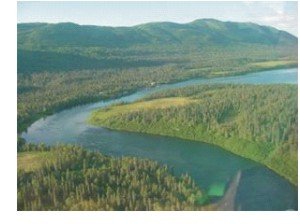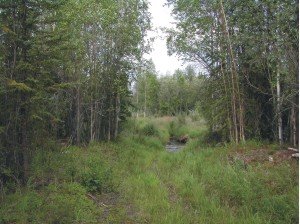Forest Legacy Program

The Forest Legacy Program protects environmentally important forest lands threatened with conversion to nonforest uses. Management of lands placed under the Forest Legacy Program would allow continued use of regular forest activities, such as timber harvest, hunting, fishing, recreation, and other traditional uses. By providing economic incentives to private landowners to keep their forests as forest, the Forest Legacy Program helps sustain the public benefits of forests, including clean water, fish and wildlife habitat, and the economic value of working forests.
The program is entirely voluntary. Landowners who wish to participate may either sell the property as fee simple title (all rights, both surface and subsurface), or only sell a portion of the property rights and retain ownership of the land. Conservation easements are the vehicle used for the transfer of certain property rights, providing for certain land use restrictions as stated in the conservation easement, yet maintaining the forest intact to provide for traditional forest uses.
In order to be eligible, land must be in the Forest Legacy Area, as set forth in the Alaska Forest Legacy Program Assessment of Need, dated August 23, 2002. Also, a government agency - local, state or federal - must be willing to take title to and manage either the land or the conservation easement.

Agulowak River
The federally funded Forest Legacy Program will cover 75 percent of the costs of a conservation easement or fee-title purchase, including the costs of appraisals, surveys, closing costs, title work and insurance, and other real estate transaction expenses. The other 25 percent must be matched by either the landowner or an assisting entity, such as a non-profit organization or non-federal government agency. The source of the federal funds is the Land and Water Conservation Fund, which is funded by a small percentage of royalties from federal offshore drilling. Projects are selected through a competitive process at the state then national level.
The Department of Natural Resources, Division of Forestry & Fire Protection, working in conjunction with the USDA Forest Service, is the lead state agency for Alaska's Forest Legacy Program.
Division of Forestry & Fire Protection
Interested parties must contact the Division of Forestry & Fire Protection to discuss project concepts and receive initial approval to proceed with an application.
550 W. 7th Ave., Suite 1450
Anchorage, AK 99501-3561
Phone: (907) 269-8667
Trevor.dobell@alaska.gov
Forest Stewardship Committee
The Alaska Forest Stewardship Committee serves as an advisory group to the Division of Forestry & Fire Protection regarding implementation of the Forest Stewardship Program and is consulted regarding criteria and parcel selection for the Forest Legacy Program. The Committee provides Forest Legacy Program project ranking and funding recommendations.
Completed Alaska Forest Legacy Program Acquisitions
The existing Forest Legacy Program acquisitions in Alaska were completed from 2003 to 2008 by the Alaska Department of Natural Resources Division of Parks and Outdoor Recreation, which was the state lead agency for the Forest Legacy Program from its inception in 2002 until the Division of Forestry & Fire Protection assumed the role of state lead agency in 2020. The completed projects are located adjacent to, within, or near Alaska State Park units.
Afognak - Little Waterfall & Delphine Bay Project
Agulowak River Conservation Easement and Native Allotment Project
Diamond Creek Project
Wood-Tikchik State Park In-holdings Sorensen/Gorman Project
Chena River State Recreation Area In-holding Colorado Creek

Colorado Creek
This institution is an equal opportunity provider. Program funding is made possible by the USDA Forest Service.
State of Alaska Department of Natural Resources
550 W. 7th Ave, Suite 1360
Anchorage, AK 99501-3557
Phone: (907) 269-8400
Fax: (907) 269-8901
TTY: Dial 711 or 800-770-8973
